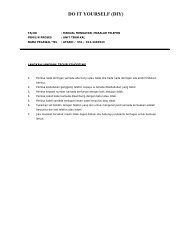chapter 6 - Malaysia Productivity Corporation ( MPC)
chapter 6 - Malaysia Productivity Corporation ( MPC)
chapter 6 - Malaysia Productivity Corporation ( MPC)
Create successful ePaper yourself
Turn your PDF publications into a flip-book with our unique Google optimized e-Paper software.
NATION’S QUALITY OF LIFE ASPIRATION<br />
measures. Secondly, knowledge accessibility is<br />
to make knowledge accessible by enhancing<br />
knowledge sharing, storage and application.<br />
This is to accelerate the learning curve and time<br />
to information, knowledge and experience by<br />
reducing duplication of work and doing right the<br />
first time.<br />
<strong>MPC</strong> is preparing the new database on productivity<br />
by improving the productivity measurement<br />
methodology. The tangible productivity measures<br />
is TFP analysis using KLEMS approach. The project<br />
is conducted in collaboration with Department<br />
of Statistics, Central Bank of <strong>Malaysia</strong>, <strong>Malaysia</strong>n<br />
Institute of Economic Research, Economic Planning<br />
Unit and academic researchers.<br />
KLEMS approach provides users with the<br />
knowledge on sources of economic growth,<br />
including growth of the five inputs (Capital, Labour,<br />
Energy, and Material and Services) and productivity<br />
at the industry level. Users will have real time<br />
information to research on sources of economic<br />
growth and structural change at the macro level<br />
and analysis on quality of labour market (by skills,<br />
education level, gender, age, etc.), technological<br />
progress and innovation using firm level database<br />
for micro level analysis<br />
The intangible productivity measures will<br />
complement tangible productivity and economic<br />
indicators besides enabling organisations to<br />
understand the needs and expectations of<br />
their customers for improvement. The National<br />
Customer Satisfaction Index (NCSI) will be <strong>MPC</strong><br />
nationwide effort to boost excellence services to<br />
both the public sector and industries. This measure<br />
will be one of the <strong>MPC</strong>’s national effort to assist<br />
216<br />
industries to consistently deliver excellent goods<br />
and services as well as to make <strong>Malaysia</strong>n industries<br />
to be recognised internationally.<br />
MoWL focuses on specific work-related aspects of<br />
quality of work life. The measures include assessment<br />
of employees job satisfaction such as individual<br />
personal characteristics and organisational<br />
cultural climate which will be assessed. The results<br />
enable management to plan appropriate action to<br />
be taken to enhance an individual’s performance<br />
and provide an opportunity for more cost-effective<br />
interventions in the workplace.<br />
Boosting <strong>Productivity</strong> Growth and Innovative<br />
Transformation<br />
<strong>Productivity</strong> growth is one of the key economic<br />
indicators of innovation for the country. Strategies<br />
based on technology and innovative transformation<br />
are required to boost the productivity growth.<br />
These include:<br />
• Reducing regulatory burden and compliance<br />
cost through regulatory review initiatives and<br />
modernising business regulation.<br />
• Enhancing the application of ICT-based<br />
technologies to strengthen innovative efforts<br />
in productions, services and marketing.<br />
• Transforming traditional jobs and conventional<br />
ways of doing things into modern jobs with<br />
high values. These can be achieved through:<br />
i. Product innovation, process innovation and<br />
marketing innovation; and<br />
ii. Inculcating Business Excellence culture<br />
through total employees participation in



